外研版英语七年级上册复习资料
外研版七年级上册英语期末复习知识点整理
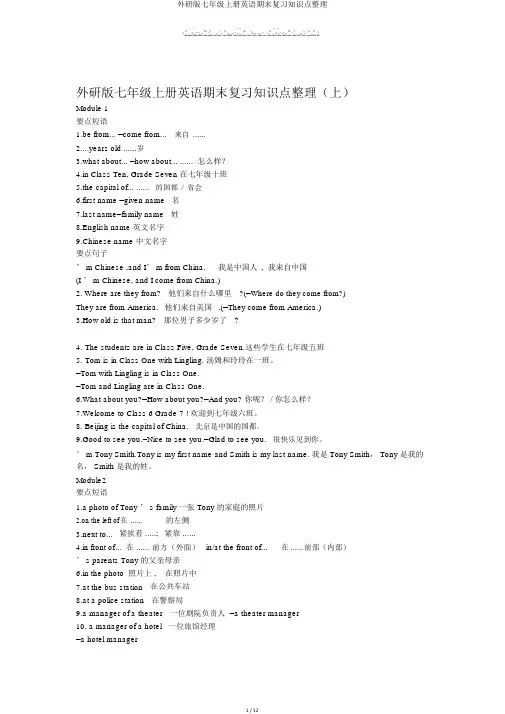
外研版七年级上册英语期末复习知识点整理(上)Module 1要点短语1.be from... =come from...来自......2....years old ......岁3.what about... =how about... ...... 怎么样?4.in Class Ten, Grade Seven 在七年级十班5.the capital of... ......的国都/省会6.first name =given name名st name=family name姓8.English name 英文名字9.Chinese name 中文名字要点句子’ m Chinese ,and I’ m from China.我是中国人,我来自中国(I ’ m Chinese, and I come from China.)2. Where are they from?他们来自什么哪里?(=Where do they come from?)They are from America.他们来自美国.(=They come from America.)3.How old is that man?那位男子多少岁了?4.The students are in Class Five, Grade Seven.这些学生在七年级五班5.Tom is in Class One with Lingling. 汤姆和玲玲在一班。
=Tom with Lingling is in Class One.=Tom and Lingling are in Class One.6.What about you?=How about you?=And you? 你呢? / 你怎么样?7.Welcome to Class 6 Grade 7 ! 欢迎到七年级六班。
8. Beijing is the capital of China.北京是中国的国都。
最新外研版七年级上英语期末复习资料和练习
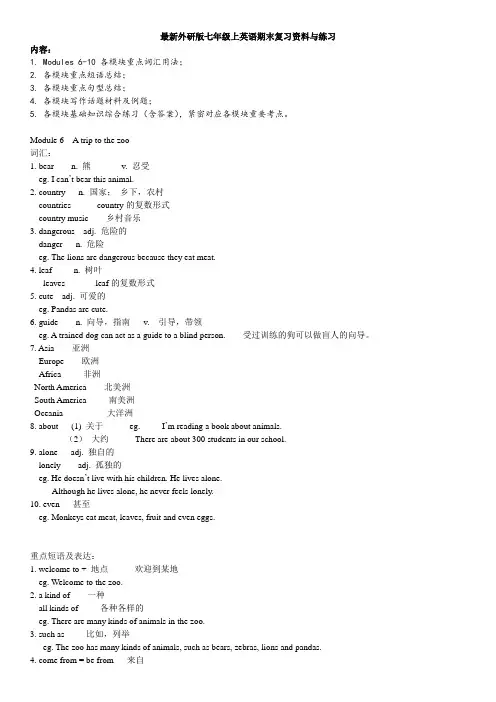
最新外研版七年级上英语期末复习资料与练习内容:1. Modules 6-10 各模块重点词汇用法;2. 各模块重点短语总结;3. 各模块重点句型总结;4. 各模块写作话题材料及例题;5. 各模块基础知识综合练习(含答案),紧密对应各模块重要考点。
Module 6 A trip to the zoo词汇:1. bear n. 熊v. 忍受eg. I can’t bear this animal.2. country n. 国家;乡下,农村countries country的复数形式country music 乡村音乐3. dangerous adj. 危险的danger n. 危险eg. The lions are dangerous because they eat meat.4. leaf n. 树叶leaves leaf的复数形式5. cute adj. 可爱的eg. Pandas are cute.6. guide n. 向导,指南v. 引导,带领eg. A trained dog can act as a guide to a blind person. 受过训练的狗可以做盲人的向导。
7. Asia 亚洲Europe 欧洲Africa 非洲North America 北美洲South America 南美洲Oceania 大洋洲8. about (1) 关于eg. I’m reading a book about animals.(2)大约There are about 300 students in our school.9. alone adj. 独自的lonely adj. 孤独的eg. He doesn’t live with his children. He lives alone.Although he lives alone, he never feels lonely.10. even 甚至eg. Monkeys eat meat, leaves, fruit and even eggs.重点短语及表达:1. welcome to + 地点欢迎到某地eg. Welcome to the zoo.2. a kind of 一种all kinds of 各种各样的eg. There are many kinds of animals in the zoo.3. such as 比如,列举eg. The zoo has many kinds of animals, such as bears, zebras, lions and pandas.4. come from = be from 来自eg. They come from different countries. = They are from different countries.Where does he come from ? = Where is he from?5. live in 生活在,居住在eg. This elephant lives in Africa.6. a little 一点儿,少量(表示肯定,修饰不可数名词)little 几乎没有(表示否定,修饰不可数名词)a few 一些(表示肯定,修饰可数名词)few 几乎没有(表示否定,修饰可数名词)eg. There’s little meat in the fridge. Can you go and get some ?There is still a little time left. I’m sure we can finish the work.He is new here and he has got few friends.7. as well as 也,还有eg. The panda eats 30 kilos of bamboo a day, as well as plants and leaves.She can play tennis as well as basketball.8. a kilo of 一千克重点句型:1. shall we +动词原形?我们一起做某事好吗?(表示提建议)eg. Shall we go and see the pandas?Let’s + 动词原形eg. Let’s go and see the pandas.2. 含有行为动词的一般现在时句式:Do lions eat meat?Yes, they do.Does the elephant eat meat?No, it doesn’t.The zebra doesn’t like meat.3. Is there an animal called Tony?叫做Tony 的,过去分词作后置定语eg. The boy called Bob comes from Canada.4. be good at sth. / doing sth 擅长做某事eg. It’s good at swimming.写作话题材料:My favorite animal(1)The zoo has many kinds of animals, such as zebras, bears, giraffes and pandas. They come from many different countries.My favorite animal is a panda.(2) Pandas live in China. There are only about 1800 pandas in China. The panda eats bamboos as well as plants and leavesevery day. They are cute. This black and white animal is the favorite of people all over the world.基础知识综合练习:一单项选择1. There are _______________ books in the school library.A. many kinds ofB. a kind ofC. kind ofD. much kind2. _________________ the kangaroo jump very far?A. IsB. DoC. DoesD. Are3. I have _______ water in my bottle. I’l l give you some.A. a fewB. fewC. a littleD. little4. Why ________ come and join us?A. don’tB. not youC. not toD. not5. Camel lives in the _____________________.A. forestB. jungleC. riverD. desert6. Is there ____________ European university in the list?A. anB. aC. theD. /7. — Where __________ from?--- He’s Beijing.A . is him B. are you C. is he D. does he8. The animals in the zoo are from different ______.A.a country B.country C.countries D.countrys9.Giraffes like to eat ______ and ______.A.grass;leaf B.grasses;leaf C.grass;leaves D.grass;leafs10. The monkeys ______ are very clever.A.come from Asia B.comes from Asia C.from Asia D.are from Asia 11.______ your father often ______ football matches?A.Do;watch B.Does;watch C.Do;watches D.Does;watches12. China is in__________.A. AfricaB. AsiaC. EuropeD. America13. He__________ his homework every day.A. doesn’t doB. don’t doC. doesn’t doesD. don’t does14. There are two __________ workers in this factory.A. thousandB. thousandsC. thousand ofD. thousands of15. —Where ________ zebras _______?—Africa.A. is; fromB. does; fromC. do, come fromD. do, from完成句子练习:1. ——袋鼠来自亚洲吗?——不,不是的。
(完整版)七年级英语上册单元复习(新版外研版)完美版
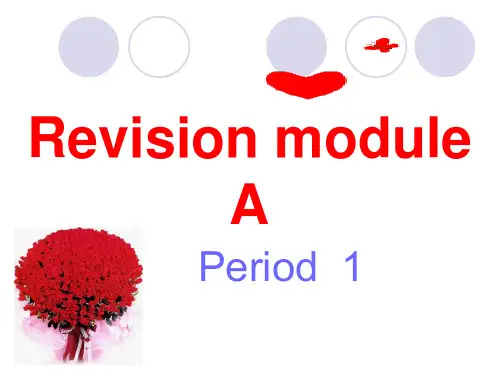
III.There be句型
There be意为“有”表示某地存在某物
单数
肯定句:There is a/an+单数名词+介词短语(地 点)。变否定句直接在is后加not,变一般疑问句直 接将is提到句首。肯定回答:Yes, there is.否定回 答:No, there isn’t.
复数
肯定句: There are some+复数名词+介词短语 (地点)。变否定句直接在are后加not,变一般疑 问句直接将are提到句首。肯定回答:Yes, there are.否定回答:No, there aren’t.
请完成下面的句子:
1.There __i_s___(be) an apple on the table.
2.There ___a__r_e(be) five pictures on the wall. 3.There __a__r_e_(be) twenty-one girls in our class.
me,_b_e__tw__e_e_n_ my grandma and grandpa.
__B_e__h_i_n_dme are my mum and dad. My
uncle iso_n_t_h_e_r_ig_h_t__of my father. He is my
nf_ae_t_hxe_t_r’t_sobmroythmeur.mM,_yo_nf_a_tthh_ee_r_’lse_sf_ti_s.teSreise the
1.Is __t_hi_s_the English class? Yes, ___is. Aint d I am _____teaycohuer r.
2.What are_th_o_se carrots.
初一英语外研版上册总复习资料
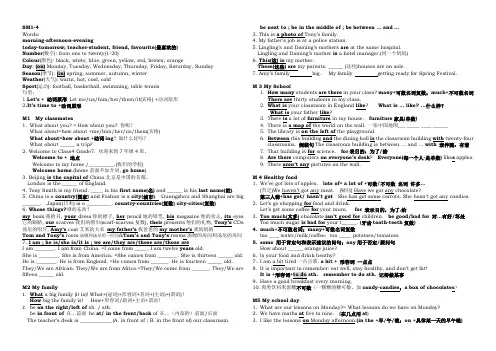
SM1-4Words:morning-afternoon-eveningtoday-tomorrow; teacher-student, friend, favourite(最喜欢的) Number(数字): from one to twenty(1-20)): black, white, blue, green, yellow, red, brown, orangeDayWeather(天气Sport(运动): football, basketball, swimming, table tennis句型:1.Let’s + 动词原形Let me/us/him/her/them/it(宾格) +动词原形2.It’s time to +动词原形M1 My classmates1.What about you? = How about you? 你呢?What about=how about +me/him/her/us/them(宾格)What about=how about +动词ing?做什么好吗?What about ______ a trip?2. Welcome to Class4 Grade7. 欢迎来到7年级4班。
Welcome to + 地点Welcome to my home./__________.(我们的学校)Welcome home.(home前面不加介词, go home)3. Beijing is the capital of China.北京是中国的首都。
London is the ______ of England.4. Tony Smith is my friend. _____ is his first name(名) and ______ is his last name(姓).5. China is a country(国家) and Foshan is a city(城市). Guangzhou and Shanghai are big_______. Japan(日本) is a __________. country-countries(复数) city-cities(复数)6. Whose things?谁的东西?my book我的书, your dress你的裙子, her pencil她的铅笔, his magazine他的杂志, its eyes它的眼睛, our scarves我们的围巾(scarf-scarves复数), their presents他们的礼物, Tony’s CDs汤尼的唱片, Amy’s coat艾米的大衣my father’s我爸爸的my mother’s我妈妈的Tom and Tony’s room汤姆和汤尼的一间房&Tom’s and Tony’s rooms汤姆的房间和汤尼的房间7. I am ; he is/she is/it is ; we are/they are/these are/those areI am ________. I am from China. =I come from _____. I am twelve years old.She is ________. She is from America. =She comes from ________. She is thirteen ______ old.He is ________. He is from England. =He comes from _______. He is fourteen ______ old.They/We are African. They/We are from Africa.=They/We come from _______. They/We arefifteen ______ old.M2 My family1.What a big family (it is)! What+(冠词)+形容词+名词+(主语)+(谓语)!How big the family is! How+形容词/副词+主语+谓语!2.be on the right/left of sb. / sth.be in front of在…前面be at/ in the front/back of 在…(内部的)前面/后面The teacher’s desk is _____________(A. in front of ; B. in the front of) our classroom.be next to ; be in the middle of ; be between … and …3. This is a photo of Tony’s family.4. My father’s job is at a police station.5. Lingling’s and Daming’s mothers are at the same hospital.Lingling and Daming’s mother is a hotel manager.(同一个妈妈)6. This(这) is my mother.These(这些) are my parents. ______ (这些)houses are on sale.7. Amy’s family big. My family getting ready for Spring Festival.M 3 My School1.How many students are there in your class? many+可数名词复数;much+不可数名词There are thirty students in my class.2.What is your classroom in England like? What is … like? …什么样?What is your father like?3.There is a lot of furniture in my house. furniture家具(单数)4.There is a map of the world on the wall. 一张中国地图___ _____ ____ ______5.The library is on the left of the playground.6.Between this building and the dining hall is the classroom building with twenty-fourclassrooms. 倒装句The classroom building is between … and …with 表伴随:有着7.That building is for science. for表目的:为了/给8.Are there computers on everyone’s desk? Everyone(每一个人-是单数) like s apples.9.There aren’t any pictures on the wall.M 4 Healthy food1.We’ve got lots of apples. lots of= a lot of +可数/不可数名词许多…(否定)We haven’t got any meat. (疑问) Have we got any chocolate?第三人称+has got/ hasn’t got She has got some carrots. She hasn’t got any candies.2.Let’s go shopping for food and drink.Let’s get some coffee for your mum. for 表示目的,为了,给3.Too much(太多) chocolate isn’t good for children. be good/bad for 对…有好/坏处Too much sugar is bad for your t______. (牙齿tooth-teeth复数)4.much+不可数名词;many+可数名词复数too ____ water/milk/coffee;too _____ potatoes/tomatoes5.some 用于肯定句和表示建议的问句;any用于否定/疑问句How about ______ orange juice?6.Is your food and drink heathy?7.I am a bit tired一点点累. a bit + 形容词一点点8.It is +形容词remember to do sth. 记得做某事9.10.肉类饮料米饭糖不可数(一颗颗的糖可数,如candy-candies;a box of chocolates)M5 My school day1.What are our lessons on Monday?= What lessons do we have on Monday?2.We have maths at five to nine. (在几点用at)3.I like the lessons on Monday afternoon.(in the +早/午/晚;on +具体某一天的早午晚)4. I love history and I am good at it. be good at sth./doing sth.擅长做某事5.6. 7. I can talk with my Chinese friends.8. I go to school on weekdays , but not on Saturday and Sunday. 9. We start work/start our lessons at nine o’ clock in the morning. 10. We have three lessons in the morning.11. We have a break in the playground at half past ten. 12. We have meat and rice with vegetables.13. I have lunch with my classmates in the dining hall at half past twelve.M6 A trip to the zoo1. Does the lion eat meat? Do tigers eat plants?2. The zoo has many kinds of animals, such as bears, zebras, giraffes and pandas.3. They come from different countries and they eat different food.4. Lions are dangerous, because they eat other animals.5. Which is Lingling the panda? She is the black and white animal over there.6. Shall we go and see them? Shall I/ we +动词原形?表建议/征询做某事7. Is there a panda called Tony?8. The elephant lives in Africa and Asia.9. The panda eats about 30 kilos of bamboo a day as well as other plants. 10. The panda is the favourite of people 11. 12. It likes water and it is good at swimming.13. I t’s strong and catches many kinds of animals for food. 14. There are about 200 kinds of monkeys.1. How do you write your homework on the computer?2. “new document”? On the left of the screen. Write it in the new document. Where do you write the name for the document? Write it in the box.3. When do you use a computer?4. What do you do next? Next, ….5. First, connect the screen to the computer.Next, connect the keyboard and the mouse to the computer. Finally, turn on the computer. turn on/off (开关) +电器类6. I share the computer with my dad. My father often goes on the internet to check the times of trains, make travel plans and buy tickets.7. On the Internet, I search for information, check my emails and send emails to my friends.8. I can only use the computer in my home every Friday night. M8 Choosing presents1. I always like birthday parties.2. Would you like to come to my birthday party? Yes, I’d love to. Would you like some cakes? Yes, please. No, thanks. What would you like for your birthday? It’s a secret (秘密).3. What do you usually do at a Chinese birthday party? At the birthday dinner, we eat noodles and cakes.4. My mother never makes a birthday cake5. She usually buys a special cake for me.6. We always sing Happy Birthday in Chinese and English for her.7. He sometimes gives cards to his mother.8. Daming always gets presents from his friends.9. My sister often goes to concerts, so I choose a concert ticket for her.10. His grandparents like to stay healthy, so every day they get some exercise. 11. Her mother spends a lot of money on clothes.12. She never watches sport on television at weekends. 13. He often buys CDs of his favourite songs.M9 People and places1.I am standing on the Great Wall of China and talking to you.2.We are on a school trip.3.He is taking lots of photos and she is buying a few presents and postcards.4.They are on sale at the shop.5.We are enjoying the school trip a lot. enjoy+sth./doing sth.6.Please send them to me by email.7.It’s time to go back to school now. go back home8.At the moment, in different places of the world, people are doing different things. 9.They are leaving work /waiting for buses or trains/ driving home/ calling home/They are getting on/off buses. having afternoon tea/seeing friends/going to the theatre.M10 Spring Festival1. This is Tony speaking. What is happening?2.Are you getting ready for the spring festival? get ready for 为…做准备3. We are quite busy getting ready for the Spring Festival. be busy doing sth.4. I am making big red lanterns. My aunt is sweeping the floor/cooking the meal.5. My mother is cleaning the house and putting things away. be at work 在工作6. help sb.(to) do sth.help sb. with sth. 7. I join them in learning a dragon dance. Hurry up!8. Christmas, Spring Festival happensevery year, but not on the same day.9. 几,一些) days before Spring Festival, my mother always clean our house and January or February. celebrating dinner on the evening before Spring Festival. …庆祝 before 在…之前/after 在…之后 11. What does “Hongbao ” means lucky money.12. watch a special programme on TV (看特别节目); wear new sweaters and coats (穿新衣);visit my uncles and aunts; get lucky money(利是钱)/a hongbao (红包)from them。
外研版七年级(上)英语复习资料
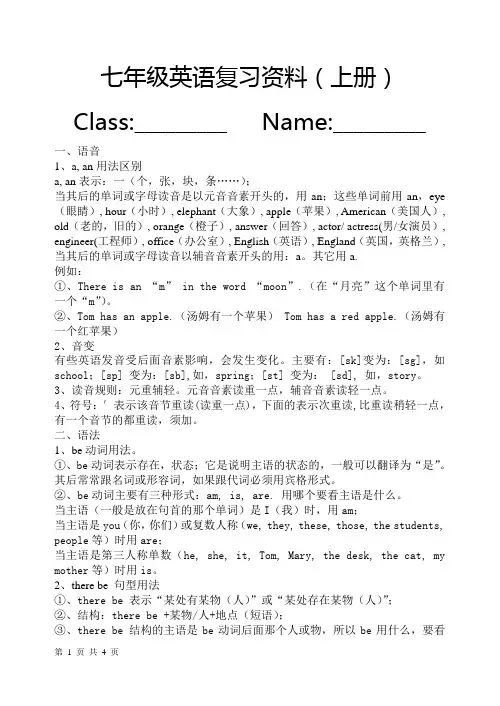
七年级英语复习资料(上册)Class:_________ Name:_________一、语音1、a, an用法区别a, an表示:一(个,张,块,条……);当其后的单词或字母读音是以元音音素开头的,用an;这些单词前用an,eye (眼睛), hour(小时), elephant(大象), apple(苹果), American(美国人), old(老的,旧的), orange(橙子), answer(回答), actor/ actress(男/女演员), engineer(工程师), office(办公室), English(英语), England(英国,英格兰), 当其后的单词或字母读音以辅音音素开头的用:a。
其它用a.例如:①、There is an “m” in the word “moon”.(在“月亮”这个单词里有一个“m”)。
②、Tom has an apple.(汤姆有一个苹果) Tom has a red apple.(汤姆有一个红苹果)2、音变有些英语发音受后面音素影响,会发生变化。
主要有:[sk]变为:[sg],如school;[sp] 变为:[sb],如,spring;[st] 变为: [sd], 如,story。
3、读音规则:元重辅轻。
元音音素读重一点,辅音音素读轻一点。
4、符号:′表示该音节重读(读重一点),下面的表示次重读,比重读稍轻一点,有一个音节的都重读,须加。
二、语法1、be动词用法。
①、be动词表示存在,状态;它是说明主语的状态的,一般可以翻译为“是”。
其后常常跟名词或形容词,如果跟代词必须用宾格形式。
②、be动词主要有三种形式:am, is, are. 用哪个要看主语是什么。
当主语(一般是放在句首的那个单词)是I(我)时,用am;当主语是you(你,你们)或复数人称(we, they, these, those, the students, people等)时用are;当主语是第三人称单数(he, she, it, Tom, Mary, the desk, the cat, my mother等)时用is。
2024外研版英语七年级上册复习知识点汇总

七年级上Revision of Starter 一、重点短语sit down坐下stand up站起来how old多大after school/class放学后/下课后listen to music听音乐welcome to+地点欢迎来某地in English用英语say that again再说一遍of course当然what color什么颜色eve,yday life每天的生活good idea好主意how many/how much多少thank you/thanks谢谢put up sb's hand举起某人的手telephone number电话号码write it on the blackboard把它写在黑板上play basketball/football打篮球/踢足球in Class Five Grade One在一年级五班see you tomorrow明天见go swimming去游泳m+国家/城市等在国家/城市等at+车站/学校/家等在车站/学校/家等sb's favorite sport/color某人最喜欢的运动/颜色good morning/afternoon/evening早上好/下午好/晚上好二、重点句型l---\邓at's your name, please? 请问你叫什么名字?---I'm/My mane's... 我叫.2.---How are you ? 你好吗?---F ine,thanks.很好,谢谢……..in spring/summer/autumn/winter在春/夏/秋/冬等3.---This is my friend/teacher, and his/her name is/he is...这是我的朋友/老师,他的名字是.4.---I t's time to go now. Goodbye.现在该走了,再见。
七年级上册英语外研版重点单词和句型
七年级上册英语外研版重点单词和句型一、单词部分1. school (n.) 学校2. teacher (n.) 老师3. student (n.) 学生4. book (n.) 书5. pen (n.) 钢笔6. desk (n.) 课桌7. ch本人r (n.) 椅子8. class (n.) 班级9.puter (n.) 电脑10. wall (n.) 墙11. whiteboard (n.) 白板12. door (n.) 门13. window (n.) 窗户14. blackboard (n.) 黑板15. classroom (n.) 教室16. library (n.) 图书馆17. playground (n.) 操场18. cafeteria (n.) 餐厅19. restroom (n.) 洗手间20. gymnasium (n.) 体育馆二、句型部分1. What's your name? 你叫什么名字?2. My name is Peter. 我叫彼得。
3. How old are you? 你多大了?4. I am twelve years old. 我十二岁。
5. Where are you from? 你来自哪里?6. I am from China. 我来自我国。
7. What do you like? 你喜欢什么?8. I like playing basketball. 我喜欢打篮球。
9. Do you have any brothers or sisters? 你有兄弟姐妹吗?10. Yes, I have a sister. 是的,我有一个妹妹。
11. What subjects do you study at school? 你在学校学什么科目?12. I study Chinese, math, English, and science. 我学中文、数学、英语和科学。
(完整版)外研版七年级英语上册全部知识点
七年级(上)Module1 My classmates1.系动词 be 的用法:am 用于第一人称 I 后 ; is 用于第三人称单数后 ;are 用于第二人称 you 及各种人称复数后。
口诀: I 是 am you 是 are is 用于 he, she, it,复数形式全用 are 。
2.陈述句变一般疑问句的句式:(1) be+主语 +...... eg: Are you a student? (2)情态动词( can)+ 主语 + 动词原形 +⋯⋯eg: Can you speak English?(3)助动词(do, does, did)+ 主语 + 动词原形 +......Eg: Do you like English?3. 代词( 1)人称代词:you you he she it they 主格: I we(做主语 )us you you him her it them 宾格: me( 作宾语 /表语 )( 2)物主代词:my our your your形容词性物主代词:his her its their (做定语 )名词性物主代词: mine ours yours yours hishers its theirs (作定语以外成分 )名词性物主代词 =形容词性物主代词 +名词 eg:mine = my book语言点解析1.Chinese n. 汉语;中国人 adj. 中国的,中国人的(1)作“语文,汉语”讲时,为不可数名词。
作“中国人”讲时,为可数名词,单复数形式相同。
Eg: He can speak a little English.We are all Chinese. 我们都是中国人。
(2)作为“中国的,中国人的” 讲时,为形容词。
I’m a Chinese student. 我是一名中国的学生。
2. What about/ How about⋯的用法(1)What about you = How about you 用来询问对方或第三者对前面所讨论话题的看法。
完整版)外研版七年级英语上册全部知识点
完整版)外研版七年级英语上册全部知识点When indicating a class and grade。
it is customary to n the class first。
followed by the grade。
For example。
"Class 1 Grade 2" should be said as "I'm in Class 1 of Grade 2." In terms of verb usage。
"am" is used after the first-person singular pronoun "I," while "is" is used after the third-person singular pronoun.When referring to family members or groups of people。
the verb "are" is used after the second-person pronoun "you" and all XXX this。
use the following mnemonic: "I am。
you are。
he/she/it is。
we/they are."Demonstrative pronouns "this" and "these" refer to objects or people that are closer to the speaker。
either in time or space。
For example。
"This is my bike" refers to a bike that is near the speaker。
外研版英语七年级上册知识点归纳完美
外研版英语七年级上册知识点归纳完美在外研版英语七年级上册中,学生将学习各种英语基础知识和语法规则。
本文将对其中的知识点进行归纳和总结,以帮助学生更好地掌握这些内容。
以下是对每个知识点的简要解释,示范句子和练习题。
一、英语字母与发音英语字母共有26个,大小写形式不同。
其中元音字母有a、e、i、o、u,其余均为辅音字母。
掌握字母的发音是学习英语的基础。
示范句子:- My name is Tom.(我的名字是汤姆。
)- Can you spell your name?(你能拼写你的名字吗?)练习题:1. What's the first letter in the alphabet?(字母表中的第一个字母是什么?)2. How do you spell "cat"?("cat"怎么拼写?)二、动词be和人称代词动词be用于表示存在、身份、特征等。
人称代词用于指代人或物。
示范句子:- I am a student.(我是一个学生。
)- She is my sister.(她是我的妹妹。
)练习题:1. ________ you a teacher?(你是一名老师吗?)2. ________ she your friend?(她是你的朋友吗?)三、名词的单复数形式名词的单数形式和复数形式有规律可循。
一般情况下,在名词的末尾加-s可以得到复数形式。
示范句子:- This is a book.(这是一本书。
)- These are pens.(这些是钢笔。
)练习题:1. This is a ________.(这是一个篮球。
)(单数形式)2. Those are ________.(那些是学生。
)(复数形式)四、冠词和不定代词冠词包括定冠词"the"和不定冠词"a/an",用于限定名词的范围。
不定代词用于泛指某人或某物。
示范句子:- I have a cat.(我有一只猫。
- 1、下载文档前请自行甄别文档内容的完整性,平台不提供额外的编辑、内容补充、找答案等附加服务。
- 2、"仅部分预览"的文档,不可在线预览部分如存在完整性等问题,可反馈申请退款(可完整预览的文档不适用该条件!)。
- 3、如文档侵犯您的权益,请联系客服反馈,我们会尽快为您处理(人工客服工作时间:9:00-18:30)。
Module 1 I.重点短语:1.be from... =come from...2....years old3.what about... =how about...4.in Class Ten, Grade Seven5.the capital of...6.first name =given namest name=family name8.English name9.Chinese nameII.重点句子:1.I’m Chinese ,and I’m from China.(I’m Chinese, and I come from China.)2. Where are they from?(=Where do they come from?)They are from America. (=They come from America.)3.How old is that man?He is forty-four.4. The students are in Class Five, Grade Seven.5. Tom is in Class One with Lingling.=Tom with Lingling is in Class One.=Tom and Lingling are in Class One.6.What about you?=How about you?=And you?7.Welcome to Class 6 Grade7 !8. Beijing is the capital of China.9.Good to see you.=Nice to see you.=Glad to see you.10.I’m Tony Smith.Tony is my first name andSmith is my last name. III.基本语法点:①Be动词的选用及基本句子结构④国家名称及其形容词1. 来自......2. ......岁3. ......怎么样?4.在七年级十班5...... 的首都/省会6.名7.姓8.英文名字9.中文名字1.我是中国人, 我来自中国.2.他们来自什么哪里?他们来自美国.3.那位男子多少岁了?他44岁.4.这些学生在七年级五班.5.汤姆和玲玲在一班.6.你呢?/你怎么样?7.欢迎到七年级六班。
8.北京是中国的首都。
9.很高兴见到你。
10.我是Tony Smith,Tony是我的名,Smith是我的姓。
②人称代词和物主代词(1)③.英文名字和中文名字的顺序和规范书写Module 2I.重点短语:1.a photo of Tony’s family2.on the left of.....3.next to.....4.in front of......in/at the front of......5.Tony’s parents6.in the photo7.at the bus station8.at a police station9.a manager of a theater=a theater manager10. a manager of a hotel=a hotel manager11.at/in the same hospital12.a bus driver13.a farm worker14.a shop worker15.an English teacherII.重点句子:1.This is a photo of Tony’sfamily2.What a big family!3.My mum’s parents are onthe right.4.The woman next to me is mydad’s sister.5.Is this your family ?6.Are these yourgrandparents ?7.My mother is the manager ofa theater.8.My father’s job is at a policestation.9.His parents are shopworkers.III基本语法点:①人称代词和物主代词(2)②名词所有格③this,that,these,those的基本用法④单数变复数以及名词复数的变化1.一张Tony 的家庭的照片2.在......的左边3.紧挨着.....; 紧靠......4.在......前面(分开)在......前面(没有分开)5.Tony的父母6.照片上7.在公共车站8.在警察局9.一位剧院负责人10.一位宾馆经理11.在同一家医院12.一位公共汽车司机13.一位农场工人14.一名店员15.一位英语教师1.这是Tony的一张全家福。
2.多大的一个家庭啊!3.我母亲的父母在右边4.紧挨着我的这位女子是我父亲的妹妹。
5.Is this your family ?5.这是你的家庭吗?6.这些是你的祖父母吗?7.我的母亲是剧院负责人。
8.我父亲在警察局工作。
9.他的父母是商店工作人员。
I1Module 3I.重点短语:1.a lot of furniture2.on everyone’s deskon the teacher’s desk3.on the wall4.at/in the front of......5.a map of the worlda map of China6.in the dining hall7.at the school gate8.on/in the playground9.a science lab10.a sports hall11.an office building12.a classroom building13.in the science building14.five computer rooms15.in the middle of......16.on the left of......17.between the library and the dining hall18.be for.......II.重点句子:1.What’s your classroom like? It’s really big.2.How many students are there in your class?There are forty-four students in my class.3.There aren’t any computers in our classroom.4.Are there any computers on everyone’s desk ?Yes, there are some.( No, there aren’t any.)5.What’s in your classroom? There is a lot of furniture.6.There is a map and some pictures on the walls.=There are some pictures anda map on the walls.7.Gao Yan’s between Zhao feng and Li Min.8.In the middle of the school isa big playground.=A big playground is in the middle of the school. 1.大量的教学设施;大量的家具2.在每个人的课桌上在讲桌上3.在墙上4.在.....前面(没有分离)5.一张世界地图一张中国地图6.在食堂里7.在校门口8.在操场上9.一个科学实验室10.一个体育馆11.一幢办公楼12.一幢教学大楼13.在科学楼里14.五个微机室15.在......的中间16.在......的左边17.在图书馆和食堂之间18.用于......;为......准备的1.你的教室怎样?它真的很大2.你班上有多少学生?我班上有44位学生。
3.在我们教室里没有电脑。
4.每位学生的课桌上有电脑吗?是的,有(不,没有。
)5.你教室里有什么?有大量的教学设备。
6.在墙上有一张地图和一些画。
7.高燕在赵峰和李民中间。
8.一个大操场在学校中间。
9.Where is the library?It’s next to the science lab.III.基本语法点:①There be句型③注意There be 和have/hasgot 的区别Module 4I.重点短语:1.have/has got...2.healthy food and drinkunhealthy food and drink3.go shopping for sth. =go tobuy sth4.too much +不可数; toomany+可数5.be good for...6.be bad for7.lots of...= a lotof...=many/much8.get sth for sb=buy sth for sb9.what kind of...10.one’s favourite food anddrink11.chicken soup12.stay healthy13.eat well14.have a good breakfast15.have sth for breakfast16.remember to do sth17.a bit tiredII.重点句子:1.We’ve got lots of apples.2.He hasn’t got any meat.3.Have you got any chocolate?Yes, we have. / No, wehaven’t.4.Let’s go shopping for foodand drink.5.Let’s get some coffee foryour mum.6.Too much chocolate isn’tgood for you.7.What kind of fruit ?8.Cola is bad for you.How about some orange juice?9.图书馆在哪里?它在科学楼的旁边。
②表方位的介词短语及用法④数词的表达1.有......2.健康的饮品和饮料健康的饮品和饮料3.去买......4.太多.......5.对......有好处6.对......有害处7.大量的......;许多......8.为某人买......9.什么种类的......10.某人最喜欢的食品饮料11.鸡汤12.保持健康13.吃好14.吃一顿营养早餐15.在早餐吃......16.记得做......17.有一点儿累1.我们有大量的苹果。
